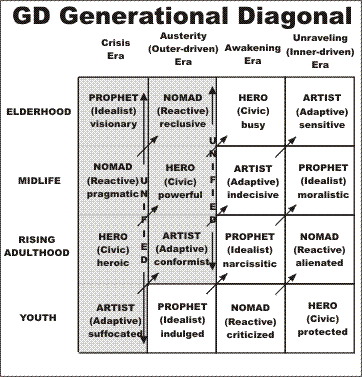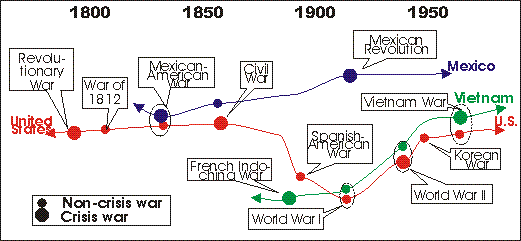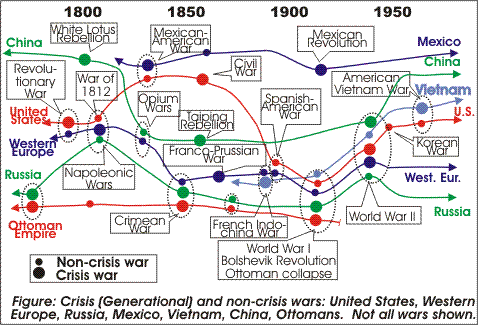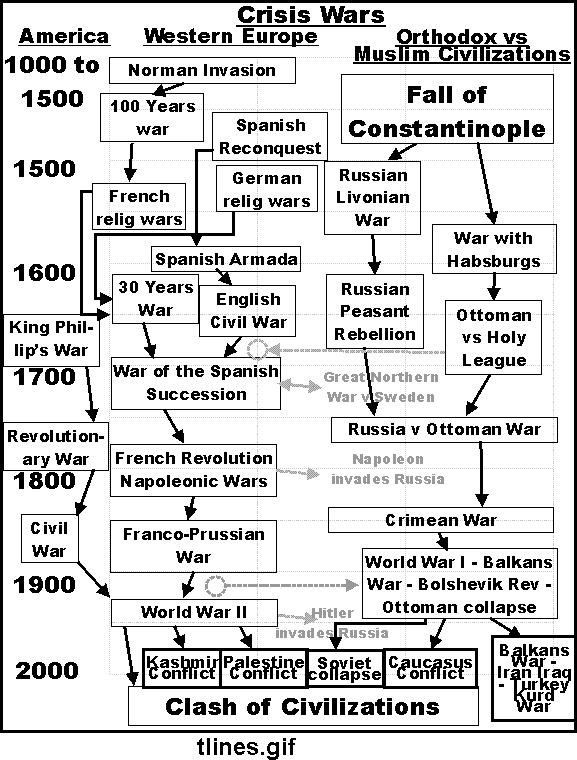Dear Kurt,
I'm starting with this statement because it's the crux of the matter.Originally Posted by Kurt Horner
The problem is that this statement is not true, by S&H's own
statements. It fails for the Civil War saeculum - don't roll your
eyes because that's exactly the point. And it fails for premodern
societies. TFT only covers 6 saeculae, all Anglo-Saxon, and it fails
for one of them.
TFT's generational paradigm simply fails in going from the Civil War
to the Great Depression. How could there be an Awakening with no
Hero generation? How could there be an Unraveling with no Awakening?
How did a generational change cause a stock market crash?
TFT only covers six saeculae, all Anglo-Saxon, and fails for one of
the six. I've successfully tested GD for hundreds of cases, and
furthermore, GD produces almost identical results as TFT for the six
saeculae that TFT covers.
This is completely untrue. My book contains dozens of detailedOriginally Posted by Kurt Horner
examples, and shows on page after page after page how generational
changes after each crisis war cause the next crisis war. If anything,
my book establishes a stronger causation than TFT does.
In fact, I used this causation model several times in the timelines
that I posted a few messages back. For example, after King Philip's
war, the colonists were forced to accept English rule for protection
from the Indians and French. That compromise unraveled in the 1760s,
leading to the Revolutionary War.
In brief: Each crisis period leads to an Austerity period where
austere rules and compromises are imposed, so that "no such war must
ever happen again." The Prophets challenge those rules during the
Awakening, the risk-aversive Artists hold things together during the
Unraveling, when all the austere rules and compromises come completely
unraveled, and then the narcissistic risk-seeking Prophets lead us
into the next war, often across the same fault line over which the
last crisis war was fought.
As far as I can tell, TFT doesn't establish anywhere near as strong a
causation model as that.
Take a look at my web site -- how I'm saying that a new Mideast
crisis war will occur with 100% certainty, caused by the generational
changes following the partitioning of Palestine in 1948. I say over
and over that the most likely time for a new regional war is when
Yasser Arafat is gone (retired or dead), and I explain why a leader
from a younger generation will not hold things together the way Arafat
has.
Take a look at my writings on Iraq - how I've been saying for a year
and a half that an Iraqi crisis civil war is impossible because of
generational changes since the Iran/Iraq war.
Take a look at discussions of Kashmir, Chechnya, Europe, and others.
Generational flow and causation is heavily embedded in each of them.
And where did I get that generational theory? I got it from TFT and
adapted it. It's basically the same theory, with some adaptations so
that it will apply not just to the six cases TFT covers, but to all
places and all times. That's a GOOD thing, and it also provides
additional validation for TFT itself, not only for the six cases, but
for the entire generational theory developed by S&H.
I don't know what I can add to what I've already said. S&H do notOriginally Posted by Kurt Horner
provide a satisfactory explanation for the 100 year period either.
There are some semantic issues here -- a crisis war versus a crisisOriginally Posted by Kurt Horner
period.
When I started studying TFT, I was very concerned about the "Great
Depression anomaly." I felt that validating TFT required
establishing an analog to the Great Depression in other fourth
turning periods. And I succeeded: There was the Panic of 1857 before
the Civil War, and the Bank of England meltdown in 1772. And of
course, there's the Nasdaq crash in 2000 for the current period.
(Since that time, I've changed my thinking a bit by developing a
separate generational explanation for major financial credit
bubbles.)
I agree that political shifts occur during crisis periods: for
example, we're seeing that today in that liberal Jewish voters and
conservative Christian voters, who used to be bitter enemies, are
suddenly aligning over the defense of Israel.
This sounds reasonable to me. I haven't really looked at this, sinceOriginally Posted by Kurt Horner
I've been more concerned about crisis wars than in dating individual
eras within the mid-cycle period.
However, remember that TFT and GD date individual eras in different
ways. TFT does it by making inferences from histories and diaries,
and GD does it by seeking historical "awakening events." These two
different methods are bound to lead to a few years' differences in
individual era dates.
You raise good questions here, but the fact is that there's no easyOriginally Posted by Kurt Horner
explanation for the 100 year interval between King Philip's War and
the Revolutionary War. TFT handles it by extending the crisis period
in a way that they leave completely unjustified. I've tried to
explain it a different way, by saying that the unraveling period can
be long.
Remember that such long intervals are very rare. I believe I've seen
an interval longer than 100 years only three times in all the cases
I've looked at. In each case I've puzzled over why the interval was
so long. One thing they all have in common is a fairly substantial
mid-cycle war in the middle (the French and Indian wars in this
case), so that may have some bearing on the generational flow.
So I agree that you're asking the right questions, but remember that
we're talking about a situation that's so rare that we don't really
have enough cases to confidently induce a good explanation for it.
Sincerely,
John
John J. Xenakis
E-mail: john@GenerationalDynamics.com
Web site: http://www.GenerationalDynamics.com
- Join Date
- May 2003
- Location
- Cambridge, MA
- Posts
- 4,010





 for if an Awakening began way early than maybe something really weird happened.
for if an Awakening began way early than maybe something really weird happened.